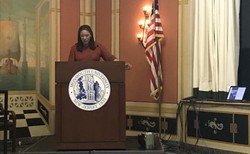Monmouth University hosted its 6th Biennial Interdisciplinary Conference on Race, themed “Race, Memory, and Identity,” which included distinguished speakers and cultural performances in Wilson Hall and Magill Commons from Nov. 14-16.
The conference aimed to bring together scholars from multiple disciplinary perspectives to broadly explore the intersections of Race, Memory, and Identity.
Through modern social, political, and media discourses the conference demonstrated the continued need to evaluate the different ways that race and identity impact memory, relating to history, trauma, loss and remembrance.
The conference was coordinated by Brooke Nappi, M.A., a Lecturer of Cultural Anthropology, and Maryanne Rhett, Ph.D., Director of Graduate Program in History and an Associate Professor of Anthropology and History.
Featured events included opening plenary remarks on Nov. 14 from William Sturkey, Ph.D., Assistant Professor of History from the University of North Carolina at Chapel Hill, as well as the Nov. 15 keynote address by Qiana Whitted, Ph.D., Director of the African American Studies Program and Professor of Literature at the University of South Carolina.
Sturkey specializes in the history of race in the South, with an interest in the histories of working-class racial minorities.
Whitted’s expertise is in 20th century African American literature and culture and American comics and graphic novels. Her most recent project explores the graphic novels. Her most recent project explores the representation of race and racism in American comic books in the 1940s and 50s.
Rhett said, “I think Qiana brings to the conference this really amazing energy and depth of analysis in pop culture in things that we typically overlook. She contextualizes structure, identity and memory and brings it to a different level, as something [the audience] can engage with a bit more.”
Whitted’s lecture reflected her latest project, EC Comics: Race, Shock, and Social Protest. She spoke about Entertaining Comics Group (EC Comics), who was an early innovator in another genre of comics: the so-called “preachies,” socially conscious stories that boldly challenged the conservatism and conformity of Eisenhower-era America.
She examined a selection of works: “Hate!,” “The Guilty!,” and “Judgment Day!” Whitted explored how they grappled with the civil rights struggle, antisemitism, and other forms of prejudice in America.
Putting these socially aware stories into conversation, Whitted drew similarities between their narrative, aesthetic, and marketing strategies. She also recounts the controversy that these stories inspired and the central role they played in congressional hearings about offensive content in comics.
Whitted said of “Judgement Day,” “Readers see Charlton’s face for the first time when he returns to his rocket… ‘the instrument lights make the beads of perspiration twinkle on his dark skin.’ For six of the seven pages, the readers do not know that the protagonist is black, nor do they know what it is meant to signify in this imagined future. [The readers] do understand that Charlton is a man of power, who has the expertise and fitness to travel though space and has been entrusted with the responsibility to evaluate the robot colony.”
Whitted explained that, through the narrative, EC invited its predominately white readership to match features of respectability and authority with a person of color.
The response to “Judgement Day,” was overwhelmingly positive. Ray Bradbury, an author who wrote the story that “Judgement Day” was based on, stated that it should be required reading in all schools.
Brittany Macaluso, a junior social work student who attended the event, said, “I thought the presenter offered an interesting perspective one that I’ve never heard connecting race to comics and how something that most think is trivial, she displayed how profound some of EC’s messages were.”
The Monmouth University race conference was founded in 2008 by Julius Adekunle, Ph.D., and Hettie V. Williams, Ph.D. This conference has brought together scholars from more than fifteen U.S. states, four continents, and twelve nations.
PHOTO TAKEN by Megan Ruggles


